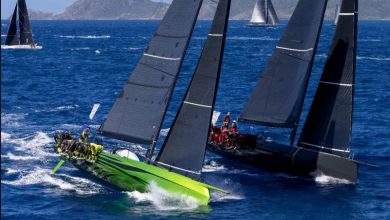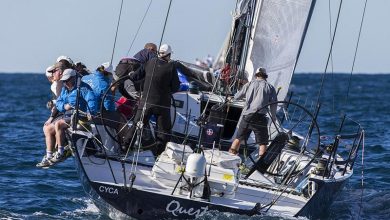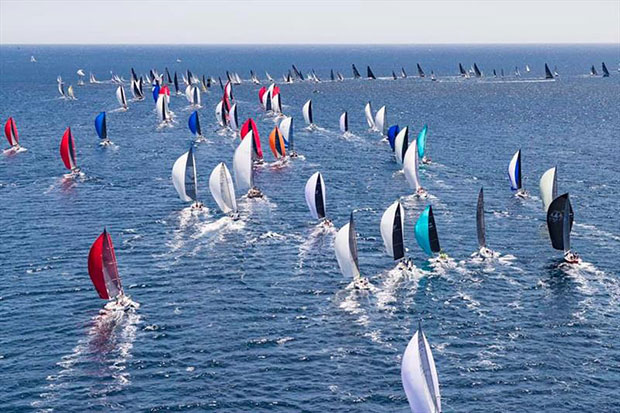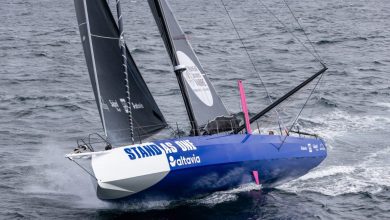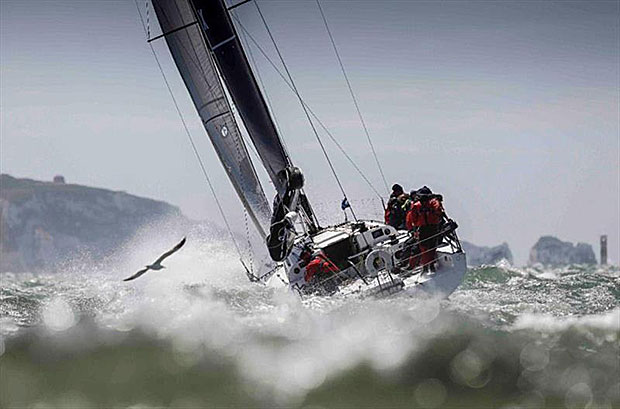Winter Vashon race 2023 & Robert Nettleton
An interview with Robert Nettleton on the 2023 Winter Vashon race
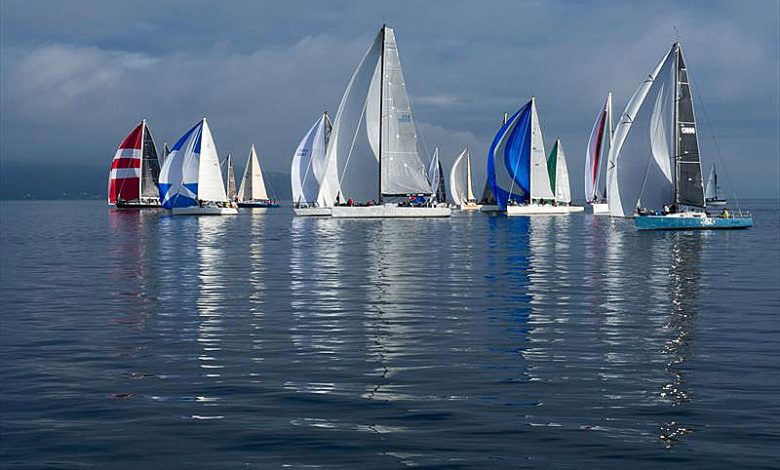
The Pacific Northwest prides itself on doing things a bit differently. In the case of sailing, this is weather-related: Our summer days are blue-sky glorious, but they’re often characterized by high-pressure systems that are void of breeze.
Not so in the dark months, as autumn, winter, and spring’s low-pressure systems are usually better at delivering the goods. As a result, many of the area’s best races—including this weekend’s Winter Vashon (December 2) race— unfurl during months when sailors from other parts of the country are either thinking about skiing or are plotting a Caribbean escape.
I’ve been fortunate to have sailed about a half dozen (maybe more) Winter Vashon races, and while the air and water can be cold (OK, sometimes frigid), the (ballpark) 30.7 nautical mile course is engaging.
Racing begins off of the Tacoma Yacht Club and takes the fleet clockwise around Vashon Island. This means that racers soon find themselves in constrained waters of Colvos Passage before rounding the island’s northern end, where the RC can elect to shorten course here, should the wind gods think it’s still summertime.
From there, it’s a big push south-southeast, passing Point Robinson Lighthouse before swinging the bow south-southwest, passing Maury Island Marine Park and—in time—the entrance to Quartermaster Harbor, before the final push to the finishing line.
Then, it’s time for hot drinks.
The race is organized by the Tacoma Yacht Club, and is part of the bigger 2023-2024 Southern Sound Series, which also includes the Duwamish Head race (January 6, 2024), the Toliva Shoal race (February 17), and the Islands Race (March 16).
I checked in with Robert Nettleton, sailing officer at the Tacoma Yacht Club, to learn more about this classic Pacific Northwest race.
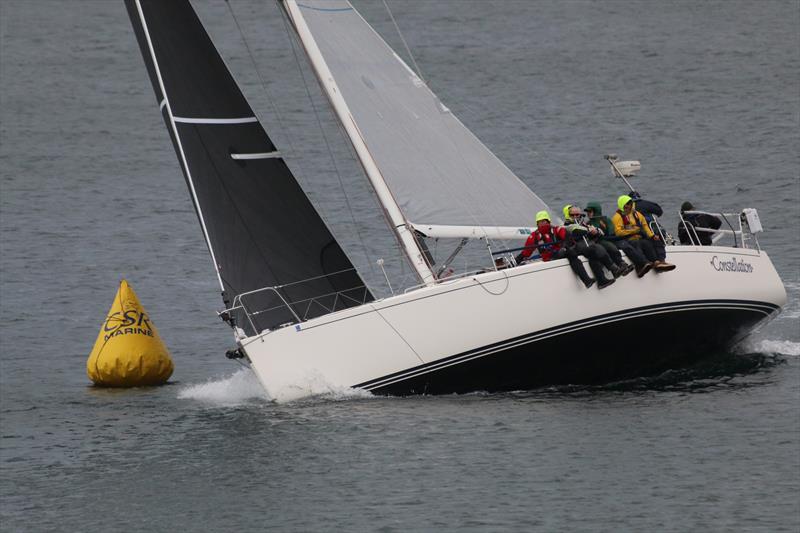
Racecourse action at the Tacoma Yacht CLub’s WInter Vashon race – photo © Dawn Umstot
Can you please tell us a bit about the the Winter Vashon race, its history, and its culture? When did the event begin, and what kinds of sailors does it tend to attract?
This is 46th Annual Winter Vashon Race. It is the first of the four South Sound Sailing Society Winter Series Races. It is held every year on the first Saturday of December.
There are “Series” awards for Best in Fleet, First Overall, and Best Overall Team. Each sponsor also provides awards for their race.
Tacoma Yacht Club (TYC) provides overnight moorage at its guest docks and wherever there is space in the basin to fit a sailing vessel. Race participants come from a geographic area from Olympia to Seattle and over to Bremerton. On occasion we have vessels from as far Edmonds, Everett, and Bellingham. If a vessel needs to arrive before Friday evening or stay longer because of the distance it has to travel, we will attempt to find moorage for that vessel.
The race is open to PHRF-rated vessels and non-PHRF rated vessels. We have experienced skippers and crew for the PHRF classes.
For those who want to see what a race is about, we have “casual” classes for vessels that have a PHRF rating and vessels that do not have a PHRF rating. The idea behind the “casual classes” is to have a more relaxed event for sailors who want to gain experience and hopefully move into the PHRF classes for more competitive racing.
What kind of entry numbers are you seeing ahead of this year’s event? How does this number stack up against previous recent editions?
Post-Covid, our entry number have remained steady at between 50 to 60 vessels. We would like to see race participation grow back to pre-Covid levels of between 70 and 80 vessels.
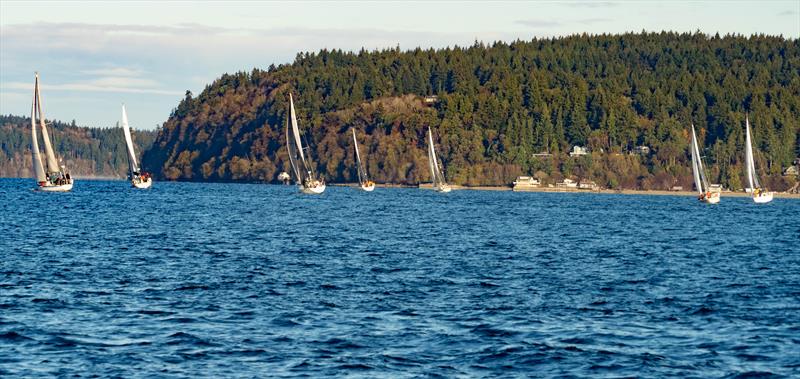
Racecourse action at the Tacoma Yacht CLub’s WInter Vashon race – photo © Mike Milligan
Let’s talk about the racecourse itself. Can you please break the race down into a few notable “chapters” and give us a quick overview of each?
The race starts near the TYC clubhouse off Dune Park. Sailors sail clockwise around Vashon Island. The race course is approximately 33.3 nautical miles.
Current can be a factor as races head from the Dune Point start toward Point Dalco on Vashon Island. The current can be strong (ebb or flood) in the area because Point Defiance (to port) is the entrance to the Narrows. There are back eddies off of Point Dalco to be aware of, especially in light wind. You can also get caught-up in eddies off Point Defiance.
The general rule is the current runs north through Colvos Passage. There are eddies throughout Colvos Passage as a vessels approaches a point – for example, Point Robinson. An eddy can be your friend or foe, especially in light air.
What we call the “to of the island mark” is located on Allen Bank approximately 500 yards north of the ferry lane. If the race is shortened to the “top of the island” due to light wind, a strong ebb tide flowing between Point Southworth and Blake Island can catch the inexperienced skipper off guard and carry a vessel above, below, into the mark, or into the race committee boat.
In light wind, if a vessel misses cannot pass between the rounding mark and the race committee boat or must take a penalty turn, the strength of the current could prevent the vessel from crossing between the committee boat and the rounding mark.
In a full-course race, after rounding the mark at the “top of the island” vessels head toward the east passage to sail down the east side of Vashon Island toward Point Roberts. When arriving at Point Roberts, sailors tack or jibe (depending on the wind direction) and change course to head toward the finish line of the TYC clubhouse.
Historically, what kind of a role do tides and currents play in the race? Also, are there sections of this course that are more affected by tide/current than others?
See discussion above. Tide and current can also play a role between the mouth of Quartermaster Harbor and the finish line. There are times when an eddy can form a nautical mile (give or take) south of the mouth of Quartermaster Harbor. Knowing when the eddy develops and how to ride the helping current from the eddy will increase boat speed.
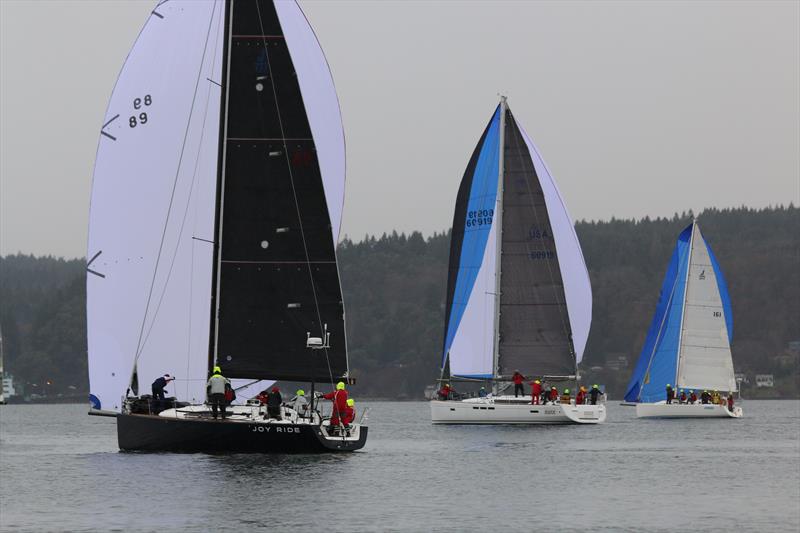
Racecourse action at the Tacoma Yacht CLub’s WInter Vashon race – photo © Dawn Umstot
Weather-wise, what kind conditions can sailors expect to encounter on Puget Sound in early December? What are the best-case and worst-case weather scenarios?
Weather condition vary from sunny and cold with light wind, to sunny and cold with winds at all strengths, to rain and and cold with light wind, and to rain and wind with all strengths.
Winter Vashon 2022 was an ideal day. It was sunny and the temperature was in the 40s. The race started with a northerly breeze that grew from 10 to 15 knots to 20 plus knots as vessels rounded the “top of the island.” The wind eased as vessels headed down the east channel.
For my vessel [it] was a port broad reach down the east channel with a jibe at Point Roberts to a starboard beam reach to the finish line.
Last year vessels completed the race before the ambient light faded. In years with a full course, vessels may not cross the finish line until after 9:00 pm.
Best-case scenario is a steady wind at 10 to 15 knots with no rain. Worst-case scenarios is little to no wind and rain or wind at 20-knots-plus with rain.
Do you see local knowledge playing a big or small role in the regatta’s outcome? Can you please explain?
Local knowledge of the currents and how the land mass affects the wind can play a big role in the regatta’s outcome, especially in light air. My experience in this race, especially in Colvos Passage, is there is slight change in direction in the wind as you sail up the pass, especially if you sail from one side of the pass to the other. In [the] center channel, you can experience a change in direction of the wind that will alter your course.
As explained above, knowing where the current flows and where the eddies are is important.
If you could offer one piece of advice to competing skippers and teams, what would it be?
Come prepared for all conditions. There is nothing like the excitement of a sailboat regatta with 50 or more vessels participating; so have fun.

Can you tell us about any efforts that you and the other regatta organizers have made to try to lower the regatta’s environmental footprint or otherwise green-up the regatta?
I never really thought of this. My experience is that the participants in Winter Vashon (and all sailors) are mindful of limiting single use plastics, vessel discharge rules, etc.
For TYC, our experienced volunteer pool has increased and we no longer need to ferry race committee officials between TYC and the “top of the island race committee boat” during the race. We are now using less fuel.
Is there anything else that you’d like to add about this year’s Winter Vashon race, for the record?
Race registration is through Regatta Network. The registration fee for this race is $45 and $50 for a late registration. There is a no host happy hour at the TYC clubhouse on Friday evening starting at 5:30 pm. The buffet dinner, which costs $25 per person, begins at 6:00PM. TYC also serves breakfast on the morning of the race, the cost is $15 per person. You can prepay for meals through Regatta Network when you register for the race.
If anyone wishes to purchase a Winter Vashon Shirt (my shameless plug and although TYC does not profit from shirt sales) to show support for the race, shirts can be ordered through Geiger at: wintervashon.brandingbygeiger.com
by David Schmidt

